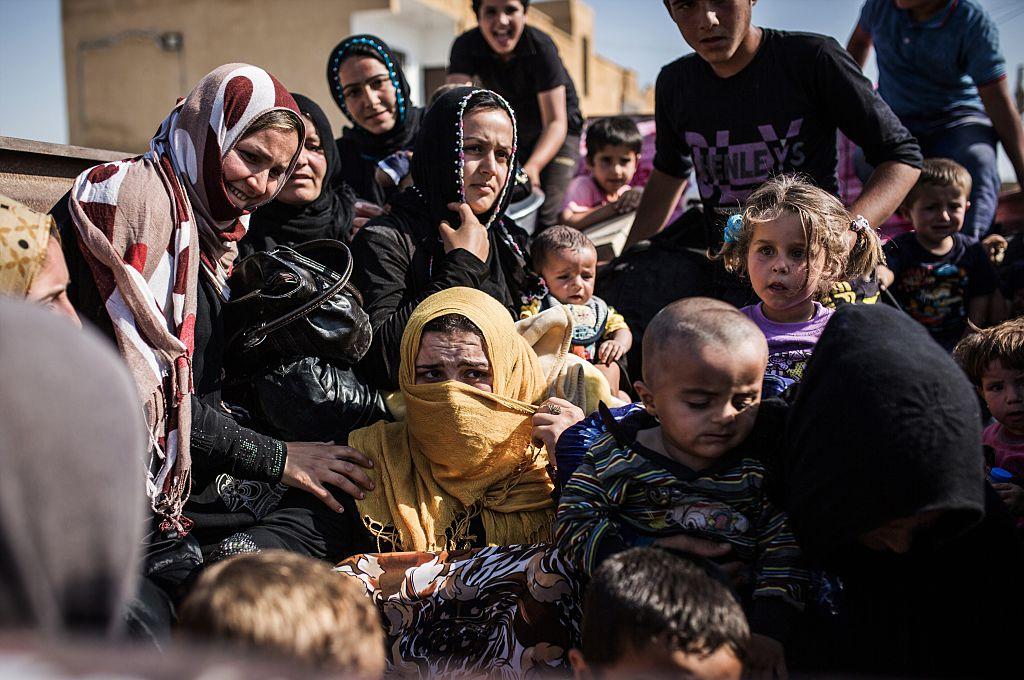Isis charging Syrian civilians $1,000 'not to be used as human shields'
Very few people have been able to leave the jihadi group’s de facto capital of Raqqa in northern Syria as US-backed fight to reclaim city begins

Your support helps us to tell the story
From reproductive rights to climate change to Big Tech, The Independent is on the ground when the story is developing. Whether it's investigating the financials of Elon Musk's pro-Trump PAC or producing our latest documentary, 'The A Word', which shines a light on the American women fighting for reproductive rights, we know how important it is to parse out the facts from the messaging.
At such a critical moment in US history, we need reporters on the ground. Your donation allows us to keep sending journalists to speak to both sides of the story.
The Independent is trusted by Americans across the entire political spectrum. And unlike many other quality news outlets, we choose not to lock Americans out of our reporting and analysis with paywalls. We believe quality journalism should be available to everyone, paid for by those who can afford it.
Your support makes all the difference.Smugglers have been charging Syrian residents of the Isis-held city of Raqqa up to $1000 (£810) for safe passage out as fears increase for civilian safety ahead of the US-backed campaign to retake the town.
A coalition of mostly Kurdish ground troops, the Syrian Democratic Forces (SDF), is in some places now just five miles (eight kilometres) away from the town’s edge. Coalition air strikes have pounded the city and surrounding strategic features such as bridges to ensure militants cannot escape when ground fighting begins.
Ahead of the impending battle, the estimated 300,000 people trapped inside Raqqa live in terrifying uncertainty over how to find safety.
While getting smuggled out is too expensive for most residents, it is not unheard of, activists still in the town or recently escaped, as well as aid organisations, have told the Associated Press on condition of anonymity for their and others’ safety.
Smugglers - often just Isis fighters looking to make some quick money - usually charge between $300 - $500 per person, but sometimes prices can soar as high as $1,000 for safe passage out of Raqqa, one Western aid worker said. Leaving Syria altogether can cost as much as $4,000, a sum far beyond the means of many caught up in the war.
Once out of Raqqa, civilians face landmines and improvised explosive devices Isis littered around countryside in an attempt to slow the SDF’s advance, as well as being captured at Isis checkpoints, or getting caught in friendly fire.
Those who make it as far as SDF controlled territory may not even be allowed entry if they cannot prove their identity or are vouched for by someone else, since the US-backed troops are wary of both fleeing Isis fighters and sleeper agents.
All men in Raqqa have been ordered to wear the jihadists’ garb of baggy clothing and long shirts, making it difficult to distinguish between civilians and militants and ensuring that the city’s population is being even more effectively utilised as human shields to protect Isis.
Operation Euphrates Wrath to retake Raqqa is designed to dovetail with the US-backed Iraqi forces campaign to retake Mosul from Isis - now in its sixth month of fighting.
Following a recent spike in civilian deaths rights groups such as Amnesty International have accused the coalition of not taking enough precautions to protect civilians in the gruelling final battle for the last quarter of the city.
In recent weeks Isis fighters have fallen back from both Mosul and Raqqa to Deir Ez Zour in northern Syria - the group’s last stronghold.
While the militants are steadily losing ground across both Syria and Iraq, Isis is likely to pose a renewed threat in the form of a global insurgency for many years to come.
The Associated Press contributed to this report
Join our commenting forum
Join thought-provoking conversations, follow other Independent readers and see their replies
Comments